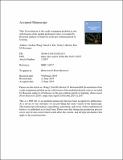Files in this item
Exacerbation of the credit assignment problem in rats with lesions of the medial prefrontal cortex is revealed by Bayesian analysis of behavior in the pre-solution period of learning
Item metadata
| dc.contributor.author | Wang, Jiachao | |
| dc.contributor.author | Tait, David S. | |
| dc.contributor.author | Brown, Verity J. | |
| dc.contributor.author | Bowman, Eric M. | |
| dc.date.accessioned | 2020-06-12T23:34:48Z | |
| dc.date.available | 2020-06-12T23:34:48Z | |
| dc.date.issued | 2019-10-17 | |
| dc.identifier | 259340607 | |
| dc.identifier | 7b48efb5-0812-4e4f-9f1f-97bef77aa79b | |
| dc.identifier | 31202862 | |
| dc.identifier | 85067860035 | |
| dc.identifier | 000478709300027 | |
| dc.identifier.citation | Wang , J , Tait , D S , Brown , V J & Bowman , E M 2019 , ' Exacerbation of the credit assignment problem in rats with lesions of the medial prefrontal cortex is revealed by Bayesian analysis of behavior in the pre-solution period of learning ' , Behavioural Brain Research , vol. 372 , 112037 . https://doi.org/10.1016/j.bbr.2019.112037 | en |
| dc.identifier.issn | 0166-4328 | |
| dc.identifier.other | ORCID: /0000-0001-9693-1739/work/60195381 | |
| dc.identifier.other | ORCID: /0000-0001-5310-7731/work/60195429 | |
| dc.identifier.other | ORCID: /0000-0001-5762-1797/work/63380676 | |
| dc.identifier.uri | https://hdl.handle.net/10023/20078 | |
| dc.description | Funding: JW received a PhD scholarship from the University of St Andrews. | en |
| dc.description.abstract | Our internal models of the world help us to process information rapidly: in general model-based learning is more rapid than model-free learning. However, the cognitive flexibility required to overcome cognitive predispositions can let us down: it is not fully developed until adulthood; predispositions can be unconscious biases; and cognitive flexibility is impaired in many psychiatric and neurological conditions. To understand these limits to flexibility, we need to know how brain generates predispositions and deploys flexibility. We performed a detailed analysis of the exploratory behavior of rats in the pre-solution period of a two-alternative forced choice discrimination learning task. Rats readily learn in which of two bowls, filled with differentially scented and textured digging materials, there is hidden bait. In a single session, they are presented with a series of discrimination learning and reversal stages. We performed a simple Bayesian analysis on the data from 68 rats, 33 of which had lesions of the medial prefrontal cortex), to examine patterns of responding in the pre-solution period. Control rats rapidly focussed on the relevant stimulus attributes and showed flexibility when required to learn about a different stimulus attribute. Rats with prefrontal cortex damage had reduced sensitivity to negative feedback. They were able to overcome this deficit and solve the credit assignment problem when there were limited alternatives or when attention was appropriately focused and predispositions matched the required response. However, the learning impairment presents as a problem with shifting attention due to the additional difficulty of solving the credit assignment problem when the attentional set is inconsistent with the required response. | |
| dc.format.extent | 943209 | |
| dc.language.iso | eng | |
| dc.relation.ispartof | Behavioural Brain Research | en |
| dc.subject | Prefrontal cortex | en |
| dc.subject | Set-shifting | en |
| dc.subject | Executive function | en |
| dc.subject | Bayes | en |
| dc.subject | Learning | en |
| dc.subject | BF Psychology | en |
| dc.subject | RC0321 Neuroscience. Biological psychiatry. Neuropsychiatry | en |
| dc.subject | DAS | en |
| dc.subject | BDC | en |
| dc.subject | R2C | en |
| dc.subject.lcc | BF | en |
| dc.subject.lcc | RC0321 | en |
| dc.title | Exacerbation of the credit assignment problem in rats with lesions of the medial prefrontal cortex is revealed by Bayesian analysis of behavior in the pre-solution period of learning | en |
| dc.type | Journal article | en |
| dc.contributor.institution | University of St Andrews. School of Psychology and Neuroscience | en |
| dc.contributor.institution | University of St Andrews. Institute of Behavioural and Neural Sciences | en |
| dc.identifier.doi | 10.1016/j.bbr.2019.112037 | |
| dc.description.status | Peer reviewed | en |
| dc.date.embargoedUntil | 2020-06-13 |
This item appears in the following Collection(s)
Items in the St Andrews Research Repository are protected by copyright, with all rights reserved, unless otherwise indicated.

